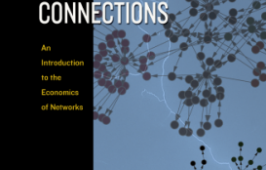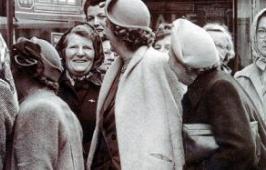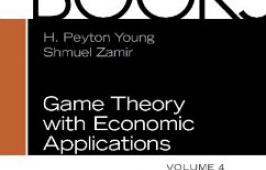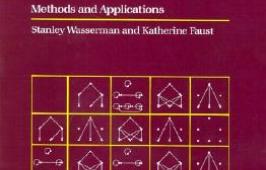Network Formation
The organization of individual agents into networks plays an important role in the determination of the outcome of many social and economic interactions. For instance, networks of personal contacts are important in obtaining information on goods and services, such as information about products or job opportunities. Many commodities are traded through networks of buyers and sellers. Network formation models analyze the networks that are likely to be stable when agents are either nearsighted or farsighted. In addition, network formation allows us to investigate whether efficient networks - the ones that maximize the overall wealth – will emerge in the long run.
Related posts
|
Article With the aid of a lab experiment, we explored how imperfect monitoring and | READ MORE ... |
Working paper One of the most famous ranking methods for digraphs is the ranking by Copeland | READ MORE ... |
From theory to application The advances in FinTech are concomitant with the development of digital | READ MORE ... |
|
Working paper This paper studies coalition formation among individuals who differ in | READ MORE ... |
Book Networks pervade social and economic life, and they play a prominent role in | READ MORE ... |
Working paper We propose a framework of network formation where players can form two types of | READ MORE ... |
|
Working paper We study global games of regime change within networks of truthful | READ MORE ... |
Article This paper presents an analysis of the European Emission Trading System as a | READ MORE ... |
Working paper A principal targets agents organized in a network of local complementarities, | READ MORE ... |
|
Article We introduce the concept of a horizon-K farsighted set to study the influence | READ MORE ... |
Working paper The outbreak of epidemics, the rise of religious radicalization, or the | READ MORE ... |
Working paper We consider a model of competitive opinion formation in which three persuaders | READ MORE ... |
|
Working paper The rise and success of digital platforms (such as Airbnb, Amazon, Booking, | READ MORE ... |
Working paper In this paper, we connect the social network theory on centrality measures to | READ MORE ... |
Working paper We experimentally study the emergence of networks under a known external threat | READ MORE ... |
|
Working paper We analyze a game in which players with unique information are arranged in a | READ MORE ... |
Working paper We study private communication in social networks prior to a majority vote on | READ MORE ... |
Working paper |
|
Article We propose a model of network formation in a Tullock contest. Agents first form | READ MORE ... |
Working paper This paper studies a noncooperative model of network formation. Built upon the | READ MORE ... |
Article We propose a model of network formation in a Tullock contest. Agents first form | READ MORE ... |
|
Article We address the problem of a planner looking for the efficient network when | READ MORE ... |
Working paper Regarding complex networks, one of the most relevant problems is to understand | READ MORE ... |
Article Network formation among individuals constitutes an important part of many OR | READ MORE ... |
|
Working paper We consider a situation in which agents have mutual claims on each other, | READ MORE ... |
Book The Oxford Handbook of the Economics of Networks represents the frontier of | READ MORE ... |
Working paper Building upon the standard model of monopolistic competition on the market | READ MORE ... |
|
Working paper This paper brings together analyses of two-way flow Strict Nash networks under | READ MORE ... |
Working paper We consider a model of influence with a set of non-strategic agents and two | READ MORE ... |
Book "A beautiful dozen. Twelve papers presented in 20 years of meetings of the | READ MORE ... |
|
Blog This blog offers an interesting view on sports and their statistical and | READ MORE ... |
Interview During the 19th CTN Workshop, organized jointly by CORE (Université catholique | READ MORE ... |
From theory to application The growth of the Internet and assorted technologies has made it possible to | READ MORE ... |
|
Working paper Studies in the social capital literature have documented two stylised facts: | READ MORE ... |
New book The ability to understand and predict behavior in strategic situations, in | READ MORE ... |
Article This paper analyzes the effects of the co-authorship and bibliographic coupling | READ MORE ... |
|
Working paper In recent literature a relevant problem has been the relationship between | READ MORE ... |
Working paper Network structure has a significant role in determining the outcomes of many | READ MORE ... |
Working paper This work proposes novel network analysis techniques for multivariate time | READ MORE ... |
|
Working paper We propose a concept to study the stability of social and economic networks | READ MORE ... |
Working paper We study the bilateral exchange of information in the context of linear | READ MORE ... |
Article In a setting of R&D competition, we study how collaboration affects | READ MORE ... |
|
Article The objective of this work is to analyze how social networks coevolve with | READ MORE ... |
Article This paper reports results from a laboratory experiment on network formation | READ MORE ... |
Article We study the formation of a communication network under perfect foresight. We | READ MORE ... |
|
Working paper The paper studies the impact of homophily on the optimal strategies of a | READ MORE ... |
Working paper This paper models the dynamic process through which a large society may succeed | READ MORE ... |
Working paper We present a game theoretic model to explain why people form life long | READ MORE ... |
|
Working paper Pairwise stability Jackson and Wolinsky [1996] is the standard stability | READ MORE ... |
Working paper We analyze delinquent networks of adolescents in the United States. We develop | READ MORE ... |
Working paper This paper argues that in the presence of intersectoral input-output linkages, | READ MORE ... |
|
Working paper We study how a behavior (an idea, buying a product, having a disease, adopting | READ MORE ... |
Working paper We investigate the relations between different types of perfect equilibrium, | READ MORE ... |
Working paper We propose a model on strategic formation of communication networks with (i) | READ MORE ... |
|
Working paper Given a graph with nonnegative edge weights and node pairs Q, we study the | READ MORE ... |
Working paper The paper concerns a model of influence in which agents make their decisions on | READ MORE ... |
Working paper We develop a strategic model of network interdiction in a non-cooperative game | READ MORE ... |
|
Working paper This paper presents a game-theoretic model of network formation, which allows | READ MORE ... |
Working paper In this paper we study the effects of institutional constraints on stability, | READ MORE ... |
Working paper We develop a theoretical framework that allows us to study which bilateral | READ MORE ... |
|
Working paper The heterogeneous connections model is a generalization of the homogeneous | READ MORE ... |
Working paper Many social networks have the following properties: (i) a short average | READ MORE ... |
Working paper We study the stability of social and economic networks when players are | READ MORE ... |
|
Working paper Our societies are heterogeneous in many dimensions such as census, education, | READ MORE ... |
Working paper The paper presents a model of network formation where every connected couple | READ MORE ... |
Working paper We define a finite-horizon repeated network formation game with consent, and | READ MORE ... |
|
Working paper We present experiments on repeated non-cooperative network formation games, | READ MORE ... |
Working paper We make four main contributions to the theory of network formation. (1) The | READ MORE ... |
Working paper This paper considers a communication network characterized by an endogenous | READ MORE ... |
|
Working paper Suppose that individual payoffs depend on the network connecting them. Consider | READ MORE ... |
Working paper This paper proves the existence of non-empty cores for directed network | READ MORE ... |
Working paper We make four main contributions to the theory of network formation. (1) The | READ MORE ... |
|
Working paper In this paper we model the formation of innovation networks as they emerge from | READ MORE ... |
Working paper This paper analyzes the formation of communication networks when players choose | READ MORE ... |
Working paper In this paper we model the formation of innovation networks as they emerge from | READ MORE ... |
|
Working paper This paper studies bilateral insurance schemes across networks of individuals. | READ MORE ... |
Working paper We examine a variety of stability and equilibrium definitions that have been | READ MORE ... |
Working paper This paper reports the results of a laboratory experiment on network formation | READ MORE ... |
|
Working paper We make two main contributions to the theory of network formation. First, we | READ MORE ... |
Working paper The structures of social interaction affect individual behavior and economic | READ MORE ... |
Working paper We examine the formation of networks among a set of players whose payoffs | READ MORE ... |
|
Working paper It is known that in two-sided many-to-many matching problems, pairwise-stable | READ MORE ... |
Working paper I survey the recent literature on the formation of networks. I provide | READ MORE ... |
Working paper The paper examines the formation of free trade agreements (FTAs) as a network | READ MORE ... |
|
Working paper Previous allocation rules for network games, such as the Myerson Value, | READ MORE ... |
Working paper We study the group stability of collective decision making when society is | READ MORE ... |
Working paper |
|
Working paper We study the stability properties of organizations in partition function games | READ MORE ... |
Working paper |
Working paper This paper studies the payoff structure of stable cooperation structures in | READ MORE ... |
|
Working paper We analyze the formation of networks among individuals. In particular, we | READ MORE ... |
Book |






